“I knew in the back of my head somewhere that Lytton was gone.”
Michele Feist
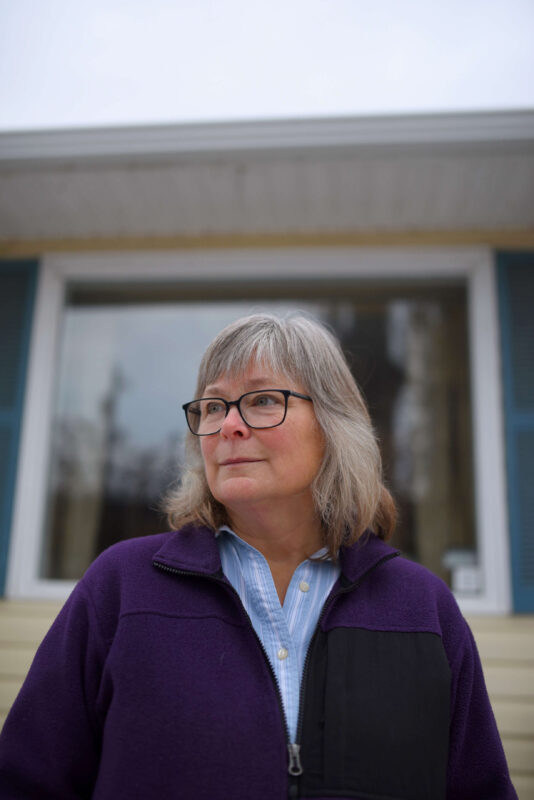
Raised on a remote farm in Fort St. John, British Columbia, Michele discovered her love of the outdoors early. She’d fill her backpack with a pop and a peanut butter and jam sandwich, cross the river that ran beside the farm, and wander into the hills. By 22, Michele moved to Vancouver to complete a psychiatric nursing diploma at BCIT, and later her registered nursing degree. Her diverse thirty-year career included mental health nursing and palliative care.
A practising Buddhist of thirty years, Michele developed close relationships with the monks at a small temple in Vancouver. The Abbot of this temple did the marriage ceremony for Michele and her husband, Grant. When Grant died in 2014, Michele pursued her and Grant’s dream of moving out of the city. The monks had relocated to the Botanie Valley so she found a home in Lytton, a town which she calls “a hidden gem because most people drive by it.”
“It’s not a shiny Shaughnessy kind of neighbourhood. You either saw the beauty or you didn’t,” says Michele, describing its rundown buildings and the amount of love in the place. “I’d sit under my tree, have my morning coffee and, because of where my house was located in Lytton, a good chunk of the population would wander by.”
The little house she lived in was over 100 years old and built after the town’s last great fire. Michele poured years of effort into fixing it up: hauling rocks, landscaping, and painting the exterior a bright yellow. She spent most of her time gardening, exploring with her large eleven-year-old rescue dog, Finn, and socialising with neighbours and friends.
After the wildfire that spread through Lytton destroyed Michele’s house, she bought a home in Williams Lake where she continues to explore, garden, and remodel the house through labour and love.
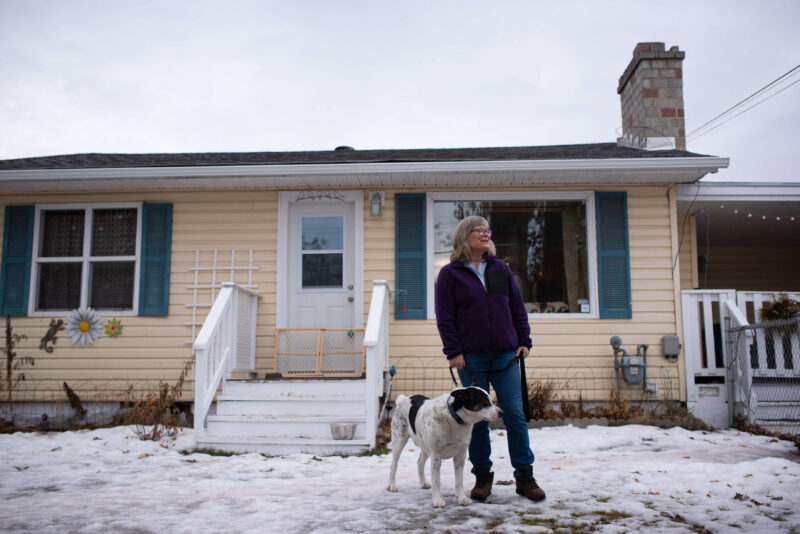
Michele Feist and her dog Finn in front of their new yellow house in Williams Lake, Canada. (CDP Photo/Philip McLachlan)
We had all been on alert because there was the George Road fire up the hill. People were on edge. The night before, I couldn’t sleep and there were a bunch of us out watching the fire. Peggy, an older friend that lived up the way, said, “I think I’m going to pack a go bag.” We didn’t dream we’d need it.
I packed my husband’s memorial album, a couple of statues that are one of a kind. The weirdest thing: a fridge magnet that I treasured, that reminds one to be kind. I put those in a box and then I packed the bag. I packed the ugliest bra, two pairs of old beat-up underwear and pants that didn’t really fit because I thought, “I’m not going to use these.”
It was so hot. Because we were in a drought from April onwards, the area was incredibly dry. In fact, twenty minutes before the fire, my friend Christine texted me and said, “How you doing?” I said, “It’s fine. But one spark leads to disaster.” We were just coming out of the heat dome. It was set to break the next day, so the temperature had come down a little bit, but then the wind picked up. It was a nasty, nasty wind. It was blowing harder than I’ve experienced and Lytton’s a windy enough place.
When the fire happened, it was very fast. We were all in our houses. I was making dinner. I looked out the window and I saw the quality of smoke had changed. There was a thickness and it rolled along lower. This roiling, brown, awful looking smoke. I knew we were in trouble then. I walked out onto the front porch just to see the lay of the land and that’s when my friends drove by. Kerri said, “Get out.” I just knew at that point.
I went in, grabbed the two things that I’d had ready in case of an evacuation. Grabbed the dog, put him in the truck. I was ready to run. I was in the truck and going then I just got an internal nudge. I actually thought, “Oh shit.” And I turned the truck around and went to get my neighbour. I knew I needed to find out if she was okay because I knew she was asleep. I worried that she’d get missed.
The front door was shut but I blew on in. She was awake. Her son had called her and she was standing holding her phone. Her house was quiet. We had this little back and forth. I remember at one point, we held hands. I said, “Lorna, we’ve got to go.” And she said, “I know.” She grabbed her purse and we went.
There were embers falling on my head. People’s backyards were on fire. What I saw was people going up and down the street, banging on doors and making sure that everyone was accounted for. It’s such a small town and we were able to say, “Okay, tell everyone that Lorna’s okay. She’s with me.” My friend Michele , she saved Peggy because Peggy kept running back into her house. So she grabbed her and said, “Get in your car and drive.” These little actions were going on all over the place. We’ve compared notes, and that is why more people didn’t die. Every single person that could, helped someone.
There was someone directing traffic. He was pointing to go north and all I could think of was : “The wind is coming from the south. I’m not letting the fire chase me.” So I went south. It was terrifying because there was zero visibility. I knew there was a vehicle in front of me. I knew someone was following me. And I was so afraid to go. I wanted to drive very quickly but I knew I couldn’t because I’d ram the person ahead of me. I was also afraid I was going to get rammed by the person behind me. So we just crept along. There were flames 6 to 8 feet high on either side of my truck. The smoke was so dense. I just kept going. And I knew in the back of my head somewhere that Lytton was gone.
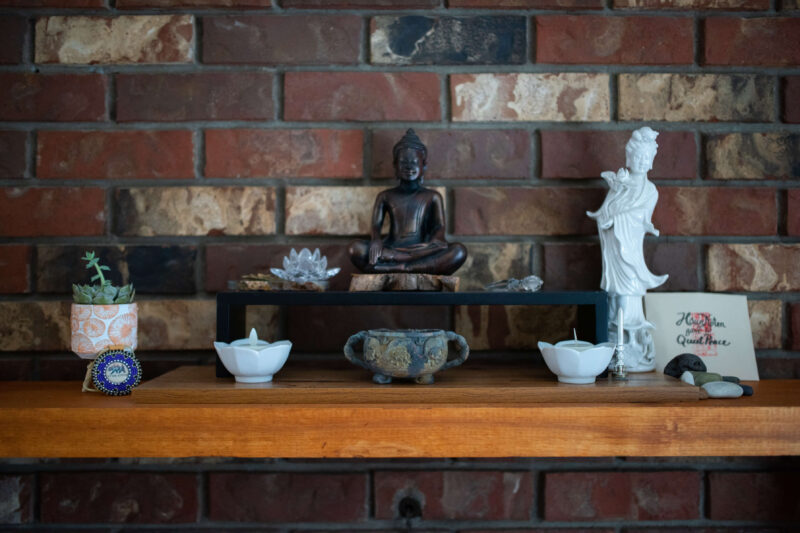
Items in Michele Feist’s home in Williams Lake, Canada, some salvaged from the ashes of the June 2021 Lytton Creek fire. (CDP Photo/Philip McLachlan)
When I got to Hope, it was right before the long weekend. There was this whole juggling act of where can displaced people go. Tourists are way more attractive than evacuees who are panicking, hauling their dogs and their kids and the rest of it. I kept thinking, “I’ll just sleep in the truck.”
The monks sheltered me. One contacted his brother in Ontario and said, “Can you get on the internet and find Michele a place?” They found me, for one night, a hotel in Hope that would take the dog. Then we scrambled again. I got booked for two weeks at the hotel in Chilliwack. It was a bit hellish because it was still a heatwave. I had two weeks to think about, “What am I going to do?”
So I sold my truck and bought this little RV and ended up taking it to a place where they were letting us camp for free for a good chunk of the summer. Its own little circle of hell because in the campground there were many evacuees, a couple of whom were quietly, not in any way intrusive, but just quietly, despairingly drinking to get through the day. Two of whom have since died.
Everybody wanted to go home. It was becoming increasingly apparent that there was no external rescue coming. There was no organization. There was no assurance of any kind of interim housing being set up. And I thought, “Well, okay, Feist. It’s time for you to look after yourself.”
I ended up trading in the RV and getting a small car. The rest of the province was also on fire. I drove up the Coquihalla [Highway] to get to Kamloops and there were fires next to the highway. I met my friend in her hotel where she and her husband and her dog were evacuated. And we just cried. We just cried together. And then I carried on because what do you do? You need to keep going.
I drove out of the smoke. I contacted my financial advisor and said, “What can I afford?” I’m privileged because my credit is good. I found a house. It’s not my dream house, but I’m converting it. It’s part of my belief system and values that if you find yourself in a situation, it’s good to apply an application of love. So that’s what I’m trying to do. The little yellow house in Lytton is paying for the little yellow house here.
Initially, there was a great impetus to “Let’s rebuild, let’s get back.” With the insurance payout it was very clear to me that my insurance was not going to cover a rebuild. I didn’t know if rebuilding was even possible. It’s been so screwed up from minute one that people don’t even have their debris cleared yet at the one-year mark.
I worry that there’s becoming various categories of people that could divide us. There’s the people who lost their houses, the people who didn’t lose their houses, people on the west side of the river who still have their places but they’ve lost the community. And people all around because Lytton was a hub for 3,000 people. So they’ve all lost, even if they’ve got a home. I know people that want to rebuild, that are trying to rebuild. I also know people that just want to put it all behind them. I’m somewhere in the middle.
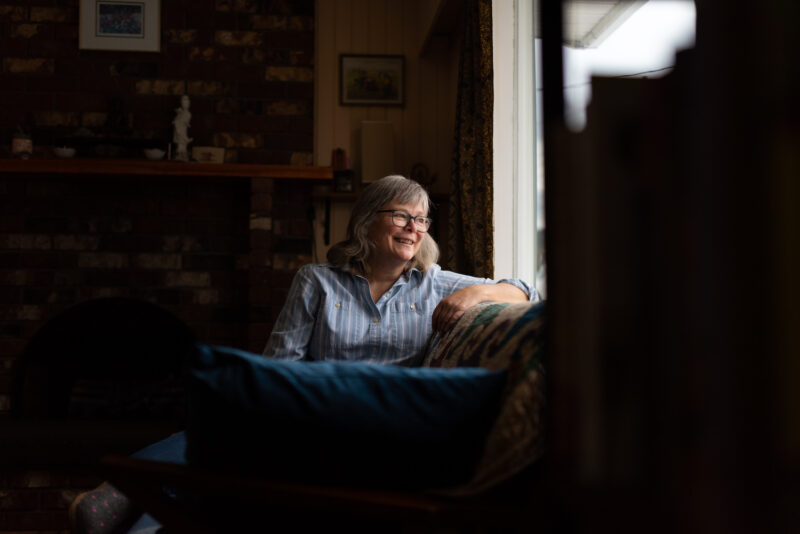
I’ll visit for sure. I will definitely be back for visits. It’s a beautiful place. Such good people. The temple is there. My husband’s ashes are up at the temple. The Abbot of this little temple, my teacher, sat with me when we sifted the remains of my house. That was last September. The authorities were very worried about toxicity. It was lucky there weren’t a lot of people around and the security was kind of lax that day. So the monk and I were able to do just a little walk. It felt so good to walk on that ground.
The house is decimated. We weren’t allowed to be on the property but a volunteer group, all masked and PPE’d up, went in and sifted. I got a couple of items out of the fire. It was scorched. It looks like a bomb blast went off. But the acacia trees are unbelievably resilient. I had an elm tree in my front yard. Half of it was green, and it sheltered a little bit of my lawn. So there’s this little patch of green. There were flowers trying to come up.
I think, ultimately, that we incline towards life. That we’re really not as a species trying to kill ourselves off. That maybe it’s going to get more uncomfortable before it gets more comfortable, but that we have the capacity to look up. What gives me hope? Planting the garden, watching seeds come up. I don’t incline to think we’re completely a lost cause. We just keep putting one foot in front of the other. We’re in the situation we’re in and keep plodding along.
This was originally published by The Tyee, on May 22, 2023.
Related Stories
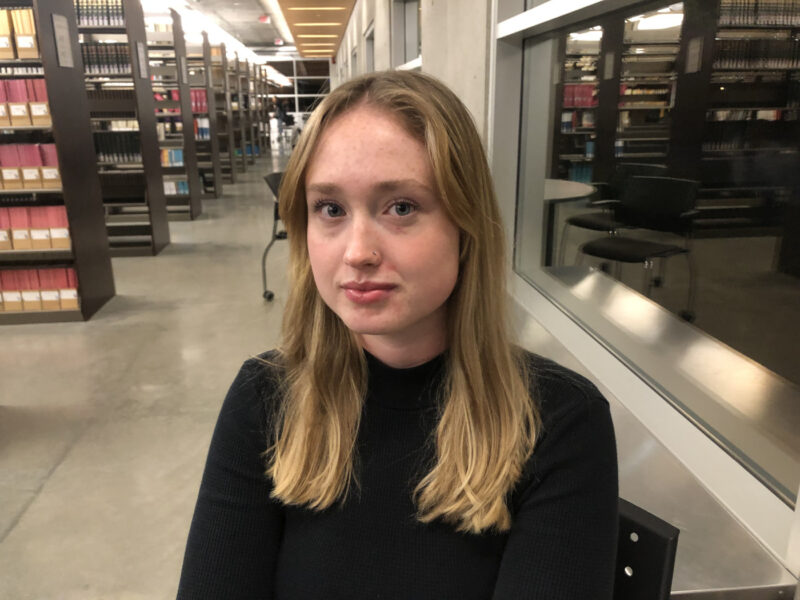
Claudia Culley, Clearwater, Canada
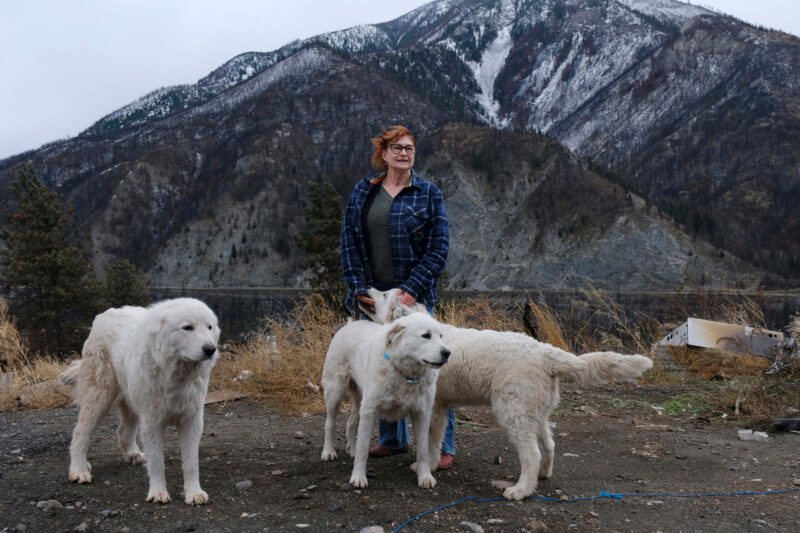
Tricia Thorpe, Lytton, Canada
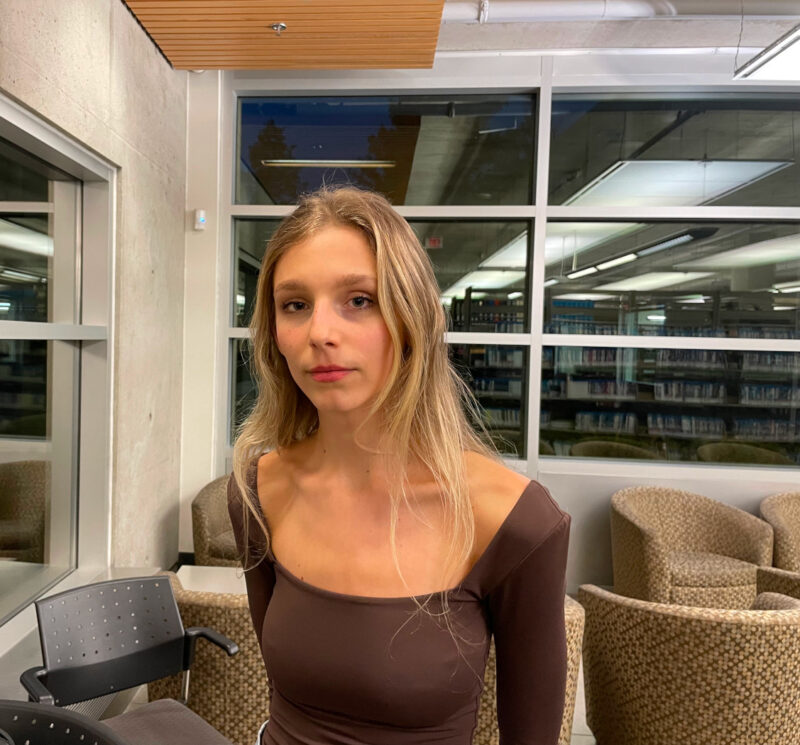
Jasna Rowse, Langley, Canada